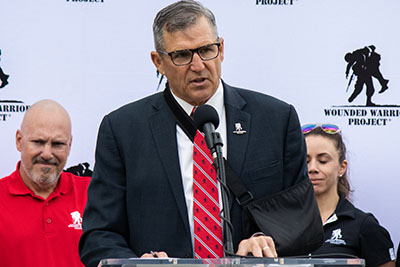It’s Time for Us to Honor Our Pact with America’s Toxic-Exposed Veterans

By WWP CEO Lt. Gen. (Ret.) Mike Linnington
After more than four years of tough work, countless meetings on Capitol Hill, and thousands of veterans making their voices heard in Washington, Congress is on the verge of passing legislation to help our warriors who were exposed to toxic burn pits. It's essential that lawmakers get the Sergeant First Class Heath Robinson Honoring Our PACT Act over the finish line.
We must improve health care and disability benefits for those who have given so much for their country but are now suffering from life-threatening illnesses because of their exposure to open pits used by the military to burn toxic material in Iraq, Afghanistan and elsewhere. Far too many are being denied the care and benefits they need, and as final negotiations take place, I urge members of Congress to think about how decades of wars continue to affect the lives of veterans – years after they leave the battlefield.
Take the case of Scott Evans. After serving as a U.S. Marine in Afghanistan for several years near football-field-sized burn pits, Scott’s health took a turn for the worse in the spring of 2020. Initially deemed ineligible for VA care, Scott had severe abdominal pain, lost about 100 pounds in a few months, and ran up $20,000 in medical bills. Eventually Scott received an official diagnosis: inoperable pancreatic cancer.
Scott reached out to a Wounded Warrior Project service representative, who was able to finally help him get enrolled at VA so he could get the care he needed. As he continues to fight his terminal cancer diagnosis, Scott bravely decided to tell his story to the world and advocate for the legislation that could soon become law of the land. The legislation would be a victory for Scott.
As this legislation nears the finish line, I also think about Andrew Myatt. After serving in the U.S. Army for more than 20 years, Andrew was diagnosed in 2018 with an aggressive form of adult leukemia, a form of blood cancer. Andrew had private health insurance, so he was able to quickly access care – in the form of three years of heavy rounds of chemotherapy.
Like Scott, Andrew also courageously decided to share his experience with the public, representing Wounded Warrior Project on the nationally televised Dr. Phil show and speaking at a major news conference outside our headquarters in Jacksonville, Fla., in April. Andrew’s story, like so many others, resonated with elected officials, his fellow veterans, and the public. That’s a major reason we are at this point today.
The road to this point was far too long, but thanks to Scott, Andrew, and countless other veterans who made their voices heard and bravely told their stories – no matter how painful – our nation is poised to honor the pact we made with the men and women who serve this great nation in uniform.
The U.S. Senate passed the Honoring Our PACT Act on June 16 with a massive bipartisan majority, but Congress still needs to take additional action for this bill to become law. When Members of the House and Senate return from their Independence Day recess, they should work as quickly as possible to pass this legislation and send it to President Biden’s desk for his signature. America’s toxic-exposed veterans have already waited far too long.
Lt. Gen. (Ret.) Mike Linnington serves as Chief Executive Officer (CEO) of Wounded Warrior Project (WWP). He graduated from the U.S. Military Academy in West Point, N.Y., in 1980 and brings 35 years of military and leadership experience to WWP.